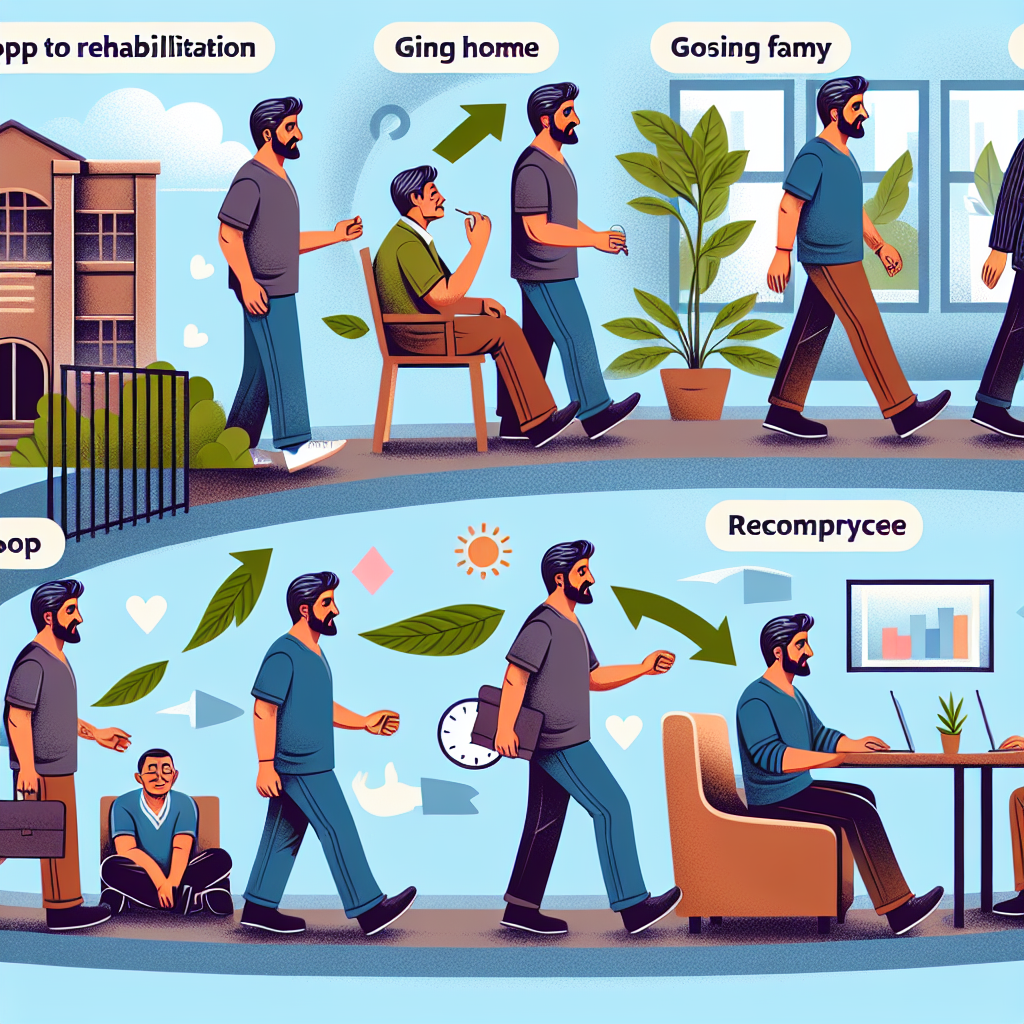-
Table of Contents
“Rekindling Trust, Restoring Hope: Rebuilding Relationships After Heroin Addiction”
Introduction
Rebuilding relationships after heroin addiction is a complex and challenging process that requires time, effort, and commitment from all parties involved. Addiction often strains or severs bonds with family, friends, and loved ones due to the behaviors and consequences associated with substance abuse. Recovery involves not only overcoming the physical and psychological aspects of addiction but also addressing the emotional and relational damage caused. Trust must be reestablished, communication improved, and mutual understanding fostered. This journey necessitates patience, empathy, and often professional support, as individuals work to heal and rebuild the connections that are vital to a fulfilling and supportive life in recovery.
Rebuilding Trust: Steps to Mend Broken Bonds
Rebuilding trust after heroin addiction is a journey that requires patience, commitment, and a deep understanding of the complexities involved. The path to mending broken bonds is often fraught with challenges, but it is also filled with opportunities for growth and renewal. The first step in this process is acknowledging the pain and hurt caused by the addiction. This acknowledgment is crucial because it validates the feelings of those who have been affected, paving the way for open and honest communication.
Once the pain has been acknowledged, the next step is to take responsibility for past actions. This involves not only admitting to the mistakes made but also demonstrating a genuine willingness to make amends. Apologies should be heartfelt and specific, addressing the particular ways in which trust was broken. It is important to remember that words alone are not enough; actions must follow to show a true commitment to change.
Consistency is key in rebuilding trust. This means showing up when you say you will, following through on promises, and being reliable in everyday interactions. Over time, these consistent actions help to rebuild a foundation of trust. It is also essential to be patient, as trust is not rebuilt overnight. It takes time for those who have been hurt to feel secure again, and pushing for quick forgiveness can be counterproductive.
In addition to consistency, transparency plays a vital role in mending broken bonds. Being open about your recovery process, including the challenges and successes, helps to build credibility. Sharing your journey can also foster a sense of connection and understanding, as it allows others to see the effort and dedication you are putting into your recovery. This transparency should extend to all areas of life, including finances, relationships, and daily activities, to demonstrate that there is nothing to hide.
Another important aspect of rebuilding trust is seeking professional help. Therapists, counselors, and support groups can provide valuable guidance and support for both the person in recovery and their loved ones. These professionals can offer strategies for effective communication, conflict resolution, and coping mechanisms, all of which are essential for rebuilding trust. Additionally, involving a neutral third party can help to mediate difficult conversations and provide a safe space for expressing emotions.
Forgiveness is a critical component of the healing process, but it is important to understand that it is a journey in itself. Forgiveness does not mean forgetting the past or excusing harmful behavior; rather, it is about letting go of resentment and finding a way to move forward. This process can be facilitated by focusing on the positive changes that have been made and the progress that continues to be achieved.
Finally, it is important to celebrate the small victories along the way. Rebuilding trust is a long and arduous process, and recognizing the milestones can provide motivation and encouragement. Whether it is a month of sobriety, a successful therapy session, or a meaningful conversation, these moments of progress should be acknowledged and celebrated.
In conclusion, rebuilding trust after heroin addiction is a multifaceted process that requires dedication, transparency, and patience. By acknowledging the pain caused, taking responsibility, being consistent, seeking professional help, and celebrating progress, it is possible to mend broken bonds and build stronger, healthier relationships. The journey may be challenging, but with perseverance and support, it is possible to create a future filled with hope and trust.
Effective Communication Strategies for Healing
Rebuilding relationships after heroin addiction is a journey that requires patience, understanding, and effective communication strategies. The path to healing is often fraught with emotional complexities, but with the right approach, it is possible to mend broken bonds and foster a supportive environment for recovery. One of the most crucial elements in this process is the ability to communicate effectively, as it lays the foundation for trust, empathy, and mutual respect.
To begin with, honesty is paramount. For someone recovering from heroin addiction, being transparent about their struggles, progress, and setbacks can help rebuild trust with loved ones. This honesty should be met with a non-judgmental attitude from family and friends, who must understand that addiction is a disease, not a moral failing. By creating a safe space for open dialogue, both parties can express their feelings and concerns without fear of retribution or misunderstanding.
Active listening is another essential component of effective communication. It involves not just hearing the words being spoken, but also understanding the emotions and intentions behind them. When a recovering addict shares their experiences, it is important for their loved ones to listen attentively, validate their feelings, and offer support. This can be achieved through reflective listening techniques, such as paraphrasing what the other person has said and asking clarifying questions. By doing so, the listener demonstrates empathy and a genuine interest in the speaker’s well-being.
Moreover, setting healthy boundaries is crucial for both the recovering addict and their loved ones. Boundaries help define acceptable behaviors and create a sense of security within the relationship. For instance, a recovering addict might need to avoid certain triggers or environments that could jeopardize their sobriety. Communicating these needs clearly and respectfully can prevent misunderstandings and foster a supportive atmosphere. Similarly, loved ones should also establish their own boundaries to protect their emotional health and avoid enabling behaviors.
In addition to verbal communication, non-verbal cues play a significant role in rebuilding relationships. Body language, eye contact, and facial expressions can convey empathy, understanding, and support. For example, maintaining eye contact and nodding while the other person speaks can show that you are fully engaged in the conversation. On the other hand, crossed arms or averted eyes might signal disinterest or discomfort. Being mindful of these non-verbal signals can enhance the overall quality of communication and strengthen the emotional connection between individuals.
Furthermore, practicing forgiveness is a vital step in the healing process. Addiction often leads to actions that hurt loved ones, and holding onto resentment can hinder the rebuilding of relationships. Both the recovering addict and their loved ones must work towards forgiving past mistakes and focusing on the present and future. This does not mean forgetting the past, but rather acknowledging it and choosing to move forward with a renewed sense of hope and commitment.
Lastly, seeking professional help can be immensely beneficial. Therapists, counselors, and support groups can provide valuable guidance and tools for effective communication. They can help individuals navigate the emotional challenges of rebuilding relationships and offer strategies for maintaining healthy interactions. Engaging in family therapy, for instance, can facilitate open discussions and promote mutual understanding among all parties involved.
In conclusion, rebuilding relationships after heroin addiction is a multifaceted process that hinges on effective communication. By embracing honesty, active listening, healthy boundaries, non-verbal cues, forgiveness, and professional support, individuals can heal emotional wounds and foster stronger, more resilient connections. The journey may be challenging, but with perseverance and compassion, it is possible to create a brighter, more hopeful future together.
The Role of Support Groups in Relationship Recovery
Rebuilding relationships after heroin addiction is a challenging yet profoundly rewarding journey. The path to recovery is often fraught with obstacles, but the role of support groups in this process cannot be overstated. These groups provide a safe space for individuals to share their experiences, gain insights, and receive encouragement from others who understand their struggles. As individuals work to mend the bonds that were strained or broken during their addiction, support groups offer a crucial foundation for rebuilding trust and fostering emotional healing.
One of the most significant benefits of support groups is the sense of community they create. Addiction can be an isolating experience, often leading to feelings of shame and guilt that further alienate individuals from their loved ones. In a support group, members find solace in knowing they are not alone. This shared understanding helps to break down the walls of isolation and opens the door to honest communication. As participants share their stories and listen to others, they begin to see that recovery is possible and that they are worthy of love and forgiveness.
Moreover, support groups provide practical tools and strategies for relationship recovery. Facilitators and fellow members often share advice on how to approach difficult conversations, set healthy boundaries, and rebuild trust. These practical insights are invaluable for individuals who may feel overwhelmed by the prospect of repairing damaged relationships. By learning from others who have successfully navigated similar challenges, participants gain the confidence and skills needed to take meaningful steps toward reconciliation.
In addition to practical advice, support groups offer emotional support that is essential for relationship recovery. The journey to rebuild trust and connection with loved ones can be emotionally taxing, and having a network of empathetic individuals can make all the difference. When setbacks occur, as they inevitably will, support group members provide a source of encouragement and remind individuals of their progress and potential. This emotional reinforcement helps to sustain motivation and resilience, which are critical for long-term recovery.
Furthermore, support groups often emphasize the importance of self-care and personal growth. Rebuilding relationships is not solely about mending external connections; it also involves healing oneself. Support groups encourage individuals to focus on their well-being, which in turn positively impacts their relationships. By prioritizing self-care, individuals become better equipped to offer genuine support and love to their loved ones. This holistic approach ensures that relationship recovery is built on a foundation of mutual respect and understanding.
Another vital aspect of support groups is the opportunity for accountability. Members hold each other accountable for their actions and commitments, fostering a sense of responsibility and integrity. This accountability is crucial for rebuilding trust, as it demonstrates a commitment to change and growth. When individuals consistently show up for themselves and their loved ones, it becomes easier for relationships to heal and flourish.
In conclusion, the role of support groups in relationship recovery after heroin addiction is multifaceted and profoundly impactful. These groups provide a sense of community, practical tools, emotional support, and opportunities for personal growth and accountability. By participating in support groups, individuals gain the strength and skills needed to rebuild trust and connection with their loved ones. The journey may be challenging, but with the support of a compassionate community, it is possible to heal and create meaningful, lasting relationships.
Setting Healthy Boundaries for Long-Term Success
Rebuilding relationships after heroin addiction is a journey that requires patience, understanding, and a commitment to setting healthy boundaries for long-term success. The path to recovery is often fraught with challenges, but it is also filled with opportunities for growth and renewal. One of the most crucial aspects of this journey is learning to establish and maintain boundaries that foster trust, respect, and mutual support.
In the early stages of recovery, it is essential to recognize that relationships may have been strained or damaged due to the behaviors associated with addiction. Loved ones may feel hurt, betrayed, or wary of trusting again. This is where setting healthy boundaries becomes vital. Boundaries serve as a framework for rebuilding trust and ensuring that both parties feel safe and respected. They help to create a sense of stability and predictability, which is particularly important in the often-turbulent process of recovery.
One of the first steps in setting healthy boundaries is open and honest communication. It is important to have candid conversations about past behaviors, current needs, and future expectations. This transparency helps to clear the air and lays the groundwork for rebuilding trust. It is also crucial to listen actively and empathetically to the concerns and feelings of loved ones. This mutual exchange fosters a sense of understanding and cooperation, which is essential for the healing process.
Another key aspect of setting boundaries is defining what is acceptable and what is not. This includes establishing limits on behaviors that may trigger a relapse or cause harm to the relationship. For instance, it may be necessary to avoid certain social situations or to limit contact with individuals who were part of the addiction lifestyle. It is also important to set boundaries around time and energy, ensuring that there is a balance between personal recovery efforts and relationship-building activities.
Consistency is another critical component of maintaining healthy boundaries. It is not enough to simply set boundaries; they must be upheld consistently to be effective. This means following through on commitments, being reliable, and demonstrating through actions that the boundaries are respected. Consistency helps to reinforce trust and shows that the commitment to recovery and the relationship is genuine.
In addition to setting and maintaining boundaries, it is important to seek support from external sources. This can include therapy, support groups, or counseling for both the individual in recovery and their loved ones. Professional guidance can provide valuable tools and strategies for navigating the complexities of rebuilding relationships. It also offers a safe space to explore emotions and challenges that may arise during the process.
Moreover, self-care plays a significant role in setting healthy boundaries. Recovery is a demanding journey, and it is essential to prioritize physical, emotional, and mental well-being. This includes engaging in activities that promote relaxation and stress relief, such as exercise, meditation, or hobbies. Taking care of oneself ensures that there is enough energy and resilience to invest in rebuilding relationships.
Ultimately, rebuilding relationships after heroin addiction is a testament to the power of resilience and the human capacity for change. By setting healthy boundaries, individuals can create a supportive and nurturing environment that fosters long-term success. It is a process that requires dedication, but the rewards of renewed trust, deeper connections, and lasting recovery are well worth the effort. Through patience, communication, and a commitment to self-care, it is possible to rebuild relationships that are stronger and more fulfilling than ever before.
Q&A
1. **How can trust be rebuilt after heroin addiction?**
– Trust can be rebuilt through consistent, honest communication, fulfilling promises, and demonstrating reliability over time.
2. **What role does therapy play in rebuilding relationships after heroin addiction?**
– Therapy provides a safe space for open dialogue, helps address underlying issues, and offers strategies for improving communication and understanding.
3. **How important is setting boundaries in the process of rebuilding relationships?**
– Setting boundaries is crucial as it helps both parties feel safe and respected, and it establishes clear expectations for behavior and interaction.
4. **What are some effective ways to show commitment to recovery in order to rebuild relationships?**
– Effective ways include attending support groups, following a treatment plan, avoiding triggers, and being transparent about progress and setbacks.
Conclusion
Rebuilding relationships after heroin addiction requires time, patience, and consistent effort. Trust must be reestablished through honest communication, accountability, and demonstrating a commitment to recovery. Support from loved ones, therapy, and support groups can facilitate this process. Ultimately, while challenging, it is possible to repair and strengthen relationships with dedication and mutual understanding.



